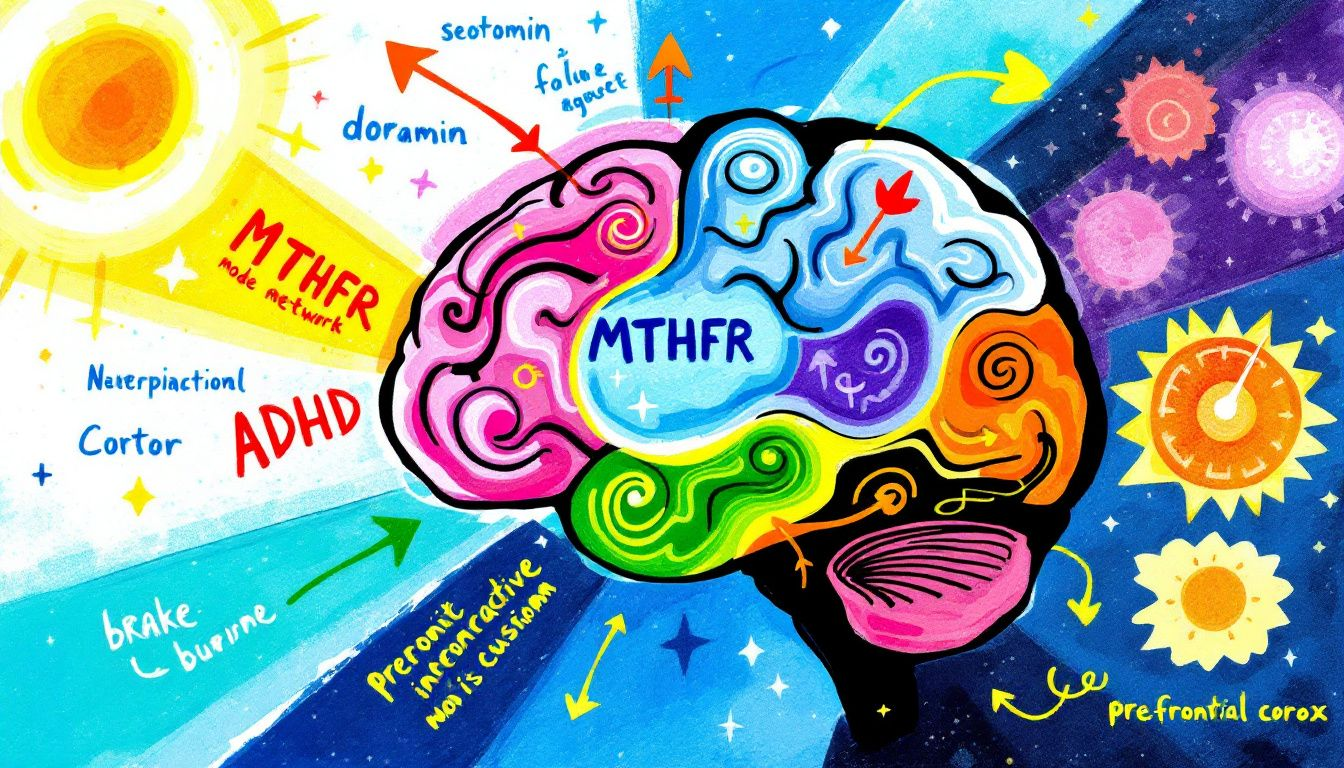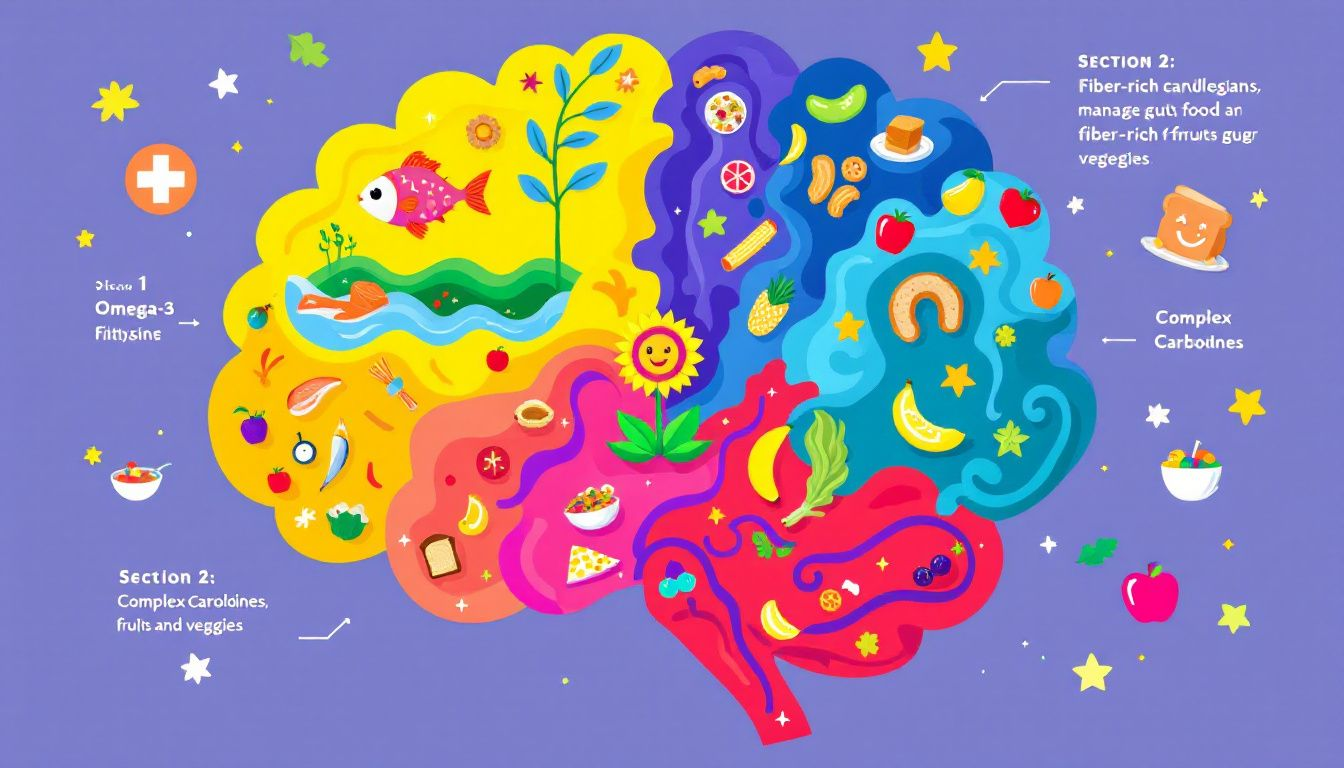Curious about how MTHFR mutations might affect ADHD? This article breaks down the connection and explores the best MTHFR ADHD treatment options. From nutritional support to genetic testing and lifestyle changes, find out what you can do.
Key Takeaways
Understanding the MTHFR gene’s role in folate metabolism is critical for comprehending its link to ADHD symptoms, highlighting the importance of adequate folate intake and MTHFR testing.
L-methylfolate supplementation is an effective treatment option for individuals with MTHFR mutations, supporting neurotransmitter production and brain function to alleviate ADHD symptoms.
Behavioral therapy, dietary changes, and environmental modifications, along with proper exercise and mindfulness practices, are essential components in a comprehensive ADHD management strategy.
L-5-MTHF is not advised for many ADHD people as it can cause depression and or anxiety in addition to making in some case ADHD symptoms worse.
Understanding MTHFR and ADHD

The MTHFR gene plays a pivotal role in the methylation cycle, which is crucial for DNA synthesis, repair, gene expression, and DNA methylation. Mutations in the MTHFR gene can hinder the conversion of folate into its active form, severely impacting amino acid metabolism essential for brain function. This disruption can lead to a host of cognitive issues, including learning and memory challenges, and is closely linked to the process called methylation and methylenetetrahydrofolate reductase.
Moreover, MTHFR mutations can cause abnormalities in neurotransmitter production, resulting in imbalances in serotonin and dopamine levels, which are critical for mood regulation and cognitive function. These neurotransmitter disruptions can manifest as symptoms resembling ADHD, such as hyperactivity, impulsivity, and difficulty maintaining attention. Understanding the role of the MTHFR gene in folate metabolism and neurotransmitter function helps to comprehend the underlying factors of ADHD.
Elevated homocysteine levels, often linked to MTHFR mutations, are associated with various health complications, including an increased risk of mental health disorders. Adequate folate intake helps manage these levels, benefiting both physical and mental well-being, and preventing folate deficiency.
Nutritional support, particularly through natural folates and L-methylfolate supplementation, can be vital for those with MTHFR mutations and folic acid. This foundational knowledge paves the way for exploring treatment options tailored to these genetic and biochemical challenges.
Genetic Testing for MTHFR Mutations
MTHFR genetic testing is increasingly recognized as a crucial step in understanding ADHD treatment options. Given that 60-70% of the general population carries at least one MTHFR polymorphism, identifying these mutations can provide crucial insights into genetic factors. Genetic testing is relatively simple, often involving a saliva sample or cheek swab.
Seeing an integrative medicine doctor for MTHFR genetic testing is advisable, as they can provide a comprehensive interpretation of results and recommend suitable interventions. Such professionals may use an array of tests, including genetic and organic acids tests, to understand the interplay between ADHD symptoms and MTHFR mutations.
Identifying MTHFR polymorphisms can guide the selection of treatment options, including dietary changes and supplementation. Genetic testing results can help tailor interventions to optimize folate metabolism and enhance overall mental health.
L-Methylfolate Supplementation

L-methylfolate supplementation has proven to be a promising approach for managing ADHD symptoms, particularly in individuals with MTHFR mutations. L-methylfolate is the active form of folate. It is essential for supporting optimal brain function and the synthesis of neurotransmitters. Research indicates that L-methylfolate can aid in reducing ADHD symptoms by supporting the body’s ability to repair the central nervous system.
Individuals with MTHFR mutations often have higher levels of homocysteine, which is associated with neurological issues. L-methylfolate supplementation can manage these levels and support overall brain health. Consulting a knowledgeable healthcare provider is necessary to determine the appropriate dosage and ensure that supplementation suits the individual’s specific needs.
Several brands of L-methylfolate supplements are available, such as Accentrate and Accentrate 110, which are designed to provide methylated folate and activated vitamins. Prescribed supplements like Enbrace also contain methylated folate, making them suitable for those with MTHFR mutations. Incorporating these supplements as part of a comprehensive treatment plan can significantly enhance the management of ADHD symptoms.
Dietary Changes for ADHD Management

Dietary modifications play a crucial role in managing ADHD symptoms by improving overall health and brain function. Eliminating certain foods, such as those high in sugar and artificial dyes, can potentially alleviate some symptoms for sensitive individuals. These dietary changes can help stabilize blood sugar levels and reduce hyperactivity and impulsivity.
Adding omega-3 fatty acids to the diet is another effective strategy for supporting brain health and potentially improving ADHD symptoms. Foods rich in omega-3s, like fatty fish and flaxseeds, can enhance cognitive function and reduce inflammation. Additionally, consuming foods high in natural folate, such as legumes and leafy greens, is recommended alongside L-methylfolate supplementation to support folate metabolism.
A balanced diet rich in fruits, vegetables, and lean proteins supports overall health and may help manage ADHD symptoms. Proper nutrition supports neurotransmitter synthesis and improves mood and cognitive function. Meal planning ensures a balanced diet and reduces reliance on unhealthy takeout options, particularly benefiting individuals with ADHD. This proactive approach to dietary management can significantly enhance the effectiveness of other treatment strategies.
Behavioral Therapy Approaches
Behavioral therapy is a cornerstone in treating ADHD, focusing on teaching skills to manage symptoms and improve daily functioning. Cognitive-behavioral therapy (CBT), for instance, equips individuals with coping strategies to handle ADHD symptoms effectively. Techniques for organization, time management, and reducing disruptive behavior are often included in the context of behavioral disorders worse.
Skills-based interventions are designed to strengthen executive functions like planning and decision-making, which are often impaired in individuals with ADHD. Such interventions help children develop better self-regulation and problem-solving skills, crucial for academic and social success.
Parent training programs, such as Parent-Child Interaction Therapy (PCIT) and the Positive Parenting Program (Triple P), are also effective in improving parent-child interactions and teaching parents how to provide consistent praise and consequences.
A behavior plan that includes rewards can motivate children with ADHD to improve focus and behavior. These plans can be tailored to the child’s specific needs and can significantly enhance the effectiveness of other treatment options, creating a supportive and structured environment for managing ADHD symptoms.
Exercise and Physical Activity
Regular physical activity is a powerful tool for managing ADHD symptoms, as it improves attention, impulse control, and mood. Sports and cardio exercises can significantly enhance cognitive functions affected by ADHD, including attention span and impulse control. Both immediate, short-duration workouts and long-term exercise regimens can improve focus and processing speed in children with ADHD.
Children with ADHD should engage in activities such as sports, dancing, and outdoor play for better well-being. These activities not only provide physical benefits but also help in developing social skills and reducing stress. Regular physical activity is a simple yet effective way to support overall behavioral health and complement other ADHD treatments.
Mindfulness Practices for ADHD

Mindfulness practices, such as meditation, deep breathing exercises, and yoga, offer significant benefits for managing ADHD symptoms. Including these techniques in a child’s daily routine promotes relaxation and stress reduction, crucial for maintaining focus and emotional stability. Mindfulness training can enhance attention regulation and executive functioning in individuals with ADHD.
Mindfulness practices encourage individuals to observe their thoughts and emotions non-reactively, aiding in emotional regulation. This can help reduce symptoms of impulsivity and improve self-control in ADHD patients. Techniques like breath awareness and body scans are particularly beneficial for managing ADHD symptoms, offering a natural and effective approach to improving mental health.
Environmental Modifications

Adjusting the environment can significantly help manage ADHD symptoms. Parents can request 504 and IEP interventions to support their child with ADHD in the school setting. These interventions can provide necessary accommodations, such as extended test times and a structured learning environment, to help the child succeed academically.
Creating a structured environment and consistent routines at home greatly benefits children with ADHD. Creating a quiet workspace in the classroom or at home can minimize distractions and enhance focus. Flexible seating options, such as wiggle chairs and standing desks, can help children stay engaged and manage their energy levels.
Color-coded materials for different subjects aid organization, making it easier for children with ADHD to track their assignments. Learning specialists can help children develop organizational strategies and effective study habits.
These environmental modifications, combined with other treatment strategies, can create a supportive framework for managing ADHD symptoms.
Consulting a Specialist
A specialist in genetics or integrative medicine can offer better insights into MTHFR testing and ADHD management. Genetic testing for MTHFR polymorphisms is becoming more common, with referrals increasing from various medical providers. These specialists can offer personalized treatment plans based on the individual’s genetic profile and specific needs.
Patients with ADHD may experience varying responses to methylfolate, making professional guidance crucial. Working with a specialist ensures that interventions address both genetic and environmental factors, optimizing overall treatment outcomes.
Summary
In summary, managing ADHD symptoms effectively requires a multi-faceted approach that addresses both genetic and environmental factors. Understanding the role of the MTHFR gene and its mutations can provide crucial insights into personalized treatment strategies. Genetic testing, L-methylfolate supplementation, dietary changes, behavioral therapy, and mindfulness practices are all integral components of a comprehensive ADHD management plan.
By integrating these various approaches, individuals with ADHD can achieve better control over their symptoms and improve their overall quality of life. Consulting with specialists and making appropriate environmental modifications can further enhance the effectiveness of these strategies. Remember, each individual’s journey with ADHD is unique, and a tailored approach is key to success.
Frequently Asked Questions
What is the MTHFR gene and how does it relate to ADHD?
The MTHFR gene plays a vital role in methylation, influencing DNA synthesis and neurotransmitter balance. Mutations in this gene may contribute to ADHD symptoms due to disrupted folate metabolism.
How can genetic testing for MTHFR mutations help in managing ADHD?
Genetic testing for MTHFR mutations can help manage ADHD by identifying specific genetic factors that influence symptoms, thereby guiding tailored treatment options such as dietary changes and supplementation. This personalized approach can enhance overall management of the condition.
What are the benefits of L-methylfolate supplementation for ADHD?
L-methylfolate supplementation can significantly enhance brain function and neurotransmitter production, potentially alleviating ADHD symptoms, especially in those with MTHFR mutations affecting folate metabolism. This makes it a valuable option for individuals seeking support in managing ADHD.
How can dietary changes impact ADHD symptoms?
Dietary changes, including the reduction of high-sugar foods and the increase of omega-3 fatty acids, can significantly improve ADHD symptoms by supporting brain function and neurotransmitter synthesis. Adopting a balanced diet rich in essential nutrients is crucial for managing these symptoms effectively.
What role do environmental modifications play in managing ADHD?
Environmental modifications, including structured routines and reduced distractions, play a crucial role in managing ADHD by enhancing focus and organization. Implementing these changes can effectively complement other treatment strategies for better overall well-being.

